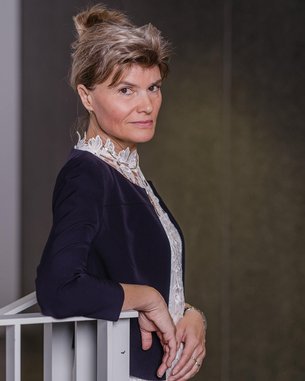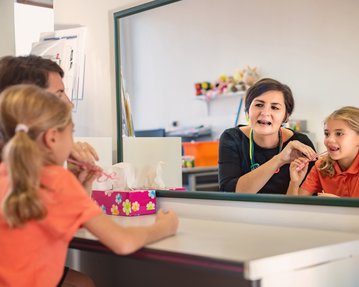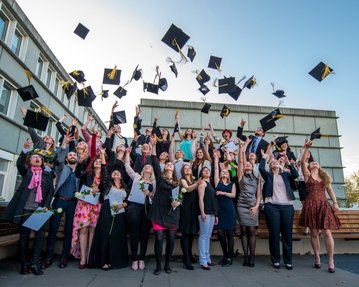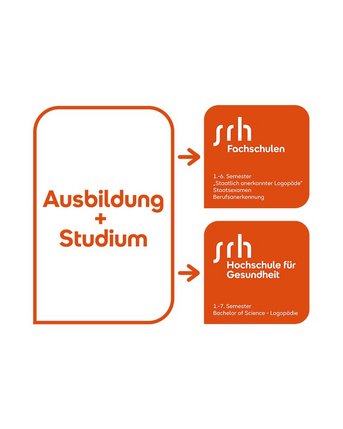
Language is the key to the world. If you can't fully access it, it interferes with life. In our bachelor's degree program in speech therapy, you'll learn how to support you support affected people through individually adapted therapy approaches.
Language is the key to the world. If you can't fully access it, it interferes with life. In our bachelor's degree program in speech therapy, you'll learn how to support you support affected people through individually adapted therapy approaches.

Did you know that the number of elderly patients in need of speech therapy has been increasing for years? Around 85% of patients with an acquired speech and language disorder have had a stroke. About 25% of them have chronic swallowing disorders after a stroke and about 10% have a speech disorder. Due to the demographic development, there are more and more people who have other diseases, such as dementia, in addition to a stroke.
But also with children the logopaedic promotion and / or therapy has been increasing continuously for years. Many of them come to the nursery, kindergarten or school with speech problems. The reason for this is often the lack of speech stimulation or speech occasions, or the fact that children do not experience a speech-promoting environment or behavior. Ideally, this can be remedied by appropriate speech therapy. The same applies to children who have to cope with their language acquisition due to a congenital speech disorder or a language development disorder, i.e. who learn under difficult conditions, in educational institutions together with other children without or even with a language problem and who additionally have a comprehensive need for therapy.
During your studies, we will teach you medical as well as linguistic, behavioral and social science basics of speech therapy. Furthermore, we will train you in theoretical as well as practical skills and competencies in the field of speech and language therapy, including speech, language, voice, swallowing, communication and hearing disorders.
A subject-specific focus during your bachelor's degree is on disorders of the acquisition of spoken and written language, including disorders of the flow of speech. Here, a critical examination of the development, implementation, and evaluation of language development programs for late speaking children, so-called "late talkers," takes place. A further specialist focus is on neurogenic speech, language and swallowing disorders. Across all disorder patterns, this is embedded in practical training on patients, which is always evidence-based and combines the latest findings from research with the best clinical experience.
Exposure to cross-disciplinary (interdisciplinary) neuroscience findings not only expands your expertise, but also allows you to transfer knowledge and independently as well as actively develop new therapeutic interventions. It will help you to evaluate and implement new findings and thus to remain professionally up-to-date with the latest scientific developments in order to provide your patients with the best possible treatment options. In addition, your bachelor's degree in speech therapy also gives you the opportunity to expand your own horizons, to set interdisciplinary priorities and thus to look beyond your "own nose".
The current changes in the health care system also require additional professional management skills in order to increase competitiveness in the health care market. Therefore, in addition to the fundamentals of medical law and basic knowledge of business administration, you will also acquire advanced knowledge of health and social systems as well as skills in project management, moderation and presentation. All of this rounds out your profile, trains you to become a specialist in the field of speech therapy, and thus offers you optimal career prospects.
After completing your training-integrated studies, a wide range of career opportunities are open to you.
In addition, your bachelor's degree offers you the opportunity to complete a master's program. A master's degree opens the way to a doctorate and an academic career. At our university, for example, you can start with our master's programs in neurorehabilitation and health and social management.


With us you study in a full-time study model, but in a so-called block structure. This means that the attendance time at our university is compressed and you can also be active in your professional activities.
Your studies take place every 14 days - on Thursdays and Fridays. This means that you can ideally combine your attendance time with your professional activity and your private requirements, and you have the chance to acquire new knowledge and apply it directly in practice at the same time. In particular, the internship, which is integrated into the study program, enables you to gain valuable insights into the professional activities of a "high professional". You will be part of a multi-professional team in fields such as prevention, counseling, diagnostics and therapy. Before, during and after the internship, you will also receive continuous practical support from lecturers at our university.
Basics of psychology, sociology, pedagogy and special education.
5Fundamentals of phonetics and linguistics
5Fundamentals of otolaryngology, phoniatrics and audiology
5Disorders of the child's speech, language and hearing development
5Scientific work I
5Basics of psychology, sociology, pedagogy and special education.
5Fundamentals of otolaryngology, phoniatrics and audiology
5Disorders of the child's speech, language and hearing development
5Evidence-based practice child development of speech, language, and hearing.
5Speech Fluency Disorders
5Presentation, rhetoric and conceptual work
5Basics of (neuro)pediatrics, child and adolescent psychology, neurology and (geronto)psychology.
5Evidence-based practice child development of speech, language, and hearing.
10Voice disorders
5Neurogenic speech and language disorders I
5Health care systems and policies, professional law and law of benefit systems.
5Basics of (neuro)pediatrics, child and adolescent psychology, neurology and (geronto)psychology.
5Voice disorders
5Evidence-based practice of voice and speech disorders.
10Neurogenic speech and language disorders I
5Neurogenic speech and language disorders II
5Psycholinguistics and patholinguistics
5Evidence-based practice in neurological speech, language, and swallowing disorders.
10Dysphagia
5Selected neuropsychological and gerontological disorders.
5Scientific work II
5Module Repetitorium
5Management in health care facilities, quality management
5Forschung und Praxis der Logopädie/ Sprachtherapie: Aktuelle Fragen
5Management in health care facilities, quality management
5Free studies
5Bachelor thesis with colloquium
10
Training or studying? With us, you don't have to choose between the two.
Together with our cooperation partner, the SRH Fachschulen, we offer a training-integrated study program that is characterized by the close integration of studies, training and practice. Our unique study model differs significantly from other study models in speech therapy, because with us you get the study and the vocational training from one source, at one location, at the same time.
Those who like to learn, learn well. That's why we make your everyday study life as pleasant as possible. Lectures, exercises and seminars provide you with the latest knowledge, which you can then deepen in small groups and put into practice. Through the close integration of teaching, practice and science, we prepare you for a professional career start and a successful professional future. Keep your finger on the pulse of the times with us.
We answer all your questions about your speech therapy studies.
Your training-integrated degree program is a full-time program consisting of classroom teaching and practical training. In addition, you should plan time for the preparation and follow-up of the events and studying for exams.
You are more than your grades. Whether you got an A in sports or art on your report card should not determine whether you can become a good speech therapist. As a private, state-recognized university, we set our own admission requirements and look at you as a person with all your motivations, which is why our bachelor's program in speech therapy is NC-free for you.
In our study program model, you get your studies and vocational training from one source at one location in only 7 semesters.
As early as the second semester, content from the courses is directly implemented in small groups in everyday practice. Through the close integration of teaching, practice and science, we prepare you for a professional career entry and a successful professional future. We teach highly didactically according to the CORE principle!
Our study groups have a maximum size of 28 people. Our practical training takes place under supervision in small groups of max. 10 students. The work with patients is done in tandems consisting of therapist/co-therapist.
Our professors have different research interests, which are also taken into account in the module teaching (e.g. child language, neurology, dysphonia, dysphagia). When choosing your undergraduate topic, you decide on a specific research topic. This can also be done as part of an ongoing research project.